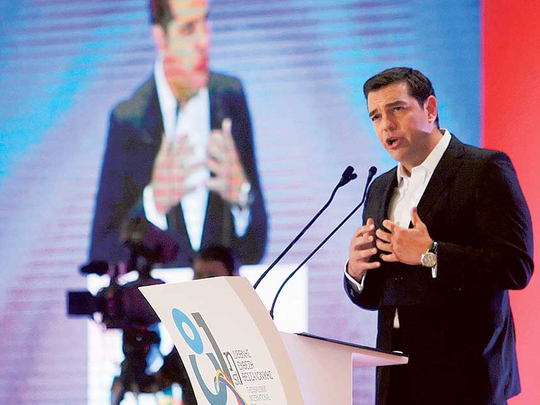
Thessaloniki, Greece: A rift between the International Monetary Fund (IMF) and the European Union (EU) on how to address Greece’s debt crisis is damaging for the country, Prime Minister Alexis Tsipras said on Sunday.
The IMF has yet to decide whether to participate in a third international bailout Greece signed up to in July last year, saying it is not convinced the country’s debt is sustainable or its fiscal targets feasible.
Greece’s debt to GDP (gross domestic product) ratio exceeds 170 per cent of national output, the highest in the Eurozone.
“I would say that what is creating conditions of delay in regaining trust of markets and investors... is the constant clash and disagreement between the IMF and European institutions,” Tsipras told a news conference in the northern city of Thessaloniki.
He said those disagreements were preventing the inclusion of Greek debt in the European Central Bank’s quantitative easing (QE) asset purchase programme. The ECB has said it cannot specify when it could start buying Greek bonds, but that Greece needs to pass a debt sustainability analysis before it happens.
Lenders have promised to look at how Greece’s debt mountain can be made sustainable, and whatever they decide will swing whether the IMF decides to sign up for the latest bailout deal.
Tsipras said time was pressing.
“A country which has made such harsh adjustment cannot wait much more... It is entitled to a fair regulation of the debt issue,” he said. “The Greek problem is a European problem.”
On Friday, Eurozone finance ministers called on Greece to stay on track with reforms it must pursue under the bailout, which is worth up to €86 billion (Dh354.6 billion), ahead of a second review of the accord that is expected to start in October.
This month, it needs to pursue energy market reforms, create a new body to oversee privatisations and establish a new independent revenue agency.
Tsipras said Greece had already completed 70 per cent of reforms required under the bailout programme.
“Normally, we should have already reaped the fruits. We should have received not only the waiver but also the QE,” he said, referring to the ECB including Greek bonds in its€80 billion per month of asset purchases.
“But we don’t have it... and this is because there is this disagreement between the IMF and Germany.”
Tsipras pledges growth, calls for prompt completion of bailout review
Thessaloniki, Athens: Greek Prime Minister Alexis Tsipras promised Saturday to deliver economic growth to a country hammered by years of economic hardship, as thousands gathered in protest at more planned austerity measures. About 15,000 protesters — beating drums, waving black flags and holding helium balloons bearing anti-government slogans — took part in demonstrations, marching through the centre of Greece’s second-largest city, Thessaloniki, where Tsipras spoke on the state of the nation’s economy. “In five disastrous years... a quarter of our national wealth was destroyed, disposable income fell by 40 per cent, unemployment soared to 28 per cent and the level of poverty rose to 38 per cent,” Tsipras said. “Now, all the indications are that this chapter is closing... Finally, we are going from a negative direction to a positive one.”
Tsipras also called for immediate completion of a review of the country’s bailout programme and a final decision on debt relief that would pave the way for its return to bond markets. Greece needs to “positively complete” the second review of its bailout programme as soon as possible, Tsipras said during a speech in Thessaloniki. The country must also join the European Central Bank’s bond buyback programme, “which will act as a catalyst for reducing borrowing costs, restoring liquidity, lifting of capital controls and an exit to markets,” Tsipras said in comments broadcast live on state-run ERT3.












